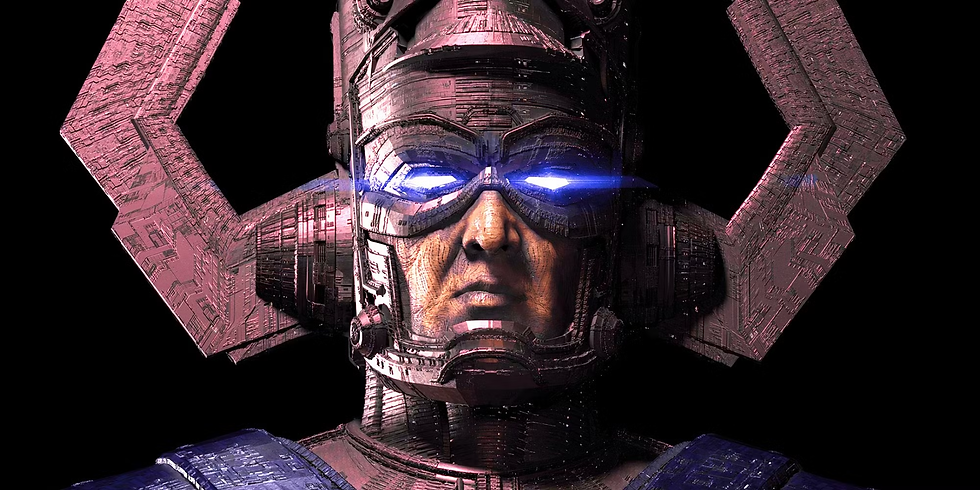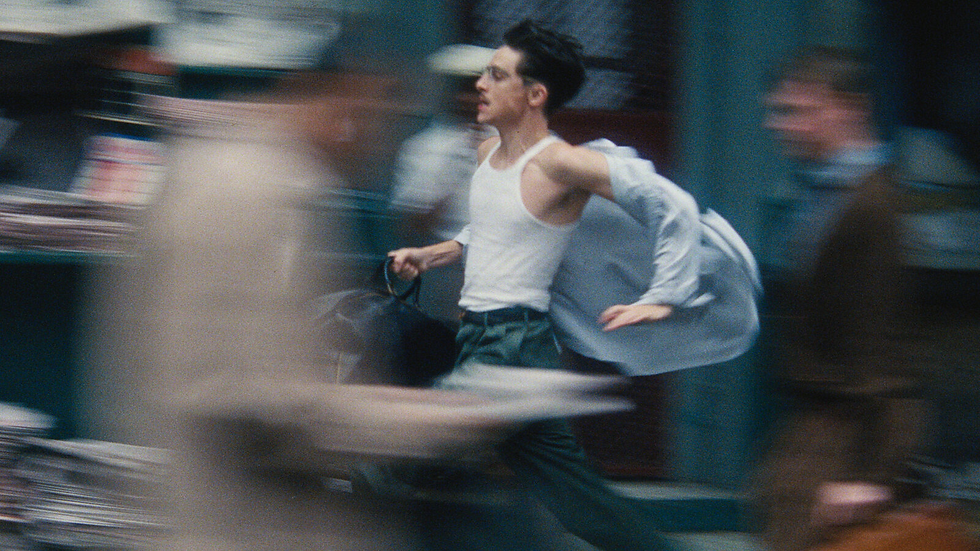"Fantastic Four: First Steps" Proves Fourth Time's a Charm
- Cillian Fay

- Jul 25, 2025
- 6 min read
[The following review is spoiler-free]
Marvel’s first family has safely landed in theaters with Matt Shakman’s The Fantastic Four: First Steps, to the delight of comic book movie fans across the world. I’m happy to report that this film truly understood what makes the Fantastic Four live up to their name. With a story ripped straight from the minds of Stan Lee and Jack Kirby, this amount of creativity and whimsy on display is truly unique compared to the Marvel Cinematic Universe's current catalog of films. While incorporating modern elements to keep audiences on their toes, this film is primarily a love letter to the 60s era of Marvel. The movie doesn’t bother to provide another repetitive origin story; it trusts the audience to understand its subtlety while expecting you to know the basics on one of Marvel’s premiere superhero teams. The Fantastic Four go back to their roots with a focus on cosmology, science, but most of all, family.

It has been no surprise that the Fantastic Four have struggled on the big screen for more than three decades at this point. Whether it be Oley Sassone’s cancelled 90s film, the poorly received mid-2000s duology by Tim Story, or the abomination that was Josh Trank’s Fantastic Four (2015). None were seen as proper representations of Marvel’s first superhero team. Each movie was embarrassed of their source material, with every attempt to modernize or “fix” aspects of the story only proving to alienate both casual and die-hard fans alike. Obviously changes in comic book media are not inherently bad; even the best comics are wrought with outdated ideals and controversial story lines, but changes should only be made if they enhance the story they are trying to tell, not in an attempt to be taken “seriously.” This time around, the Fantastic Four are tasked with saving planet Earth from the formidable cosmic entity, Galactus, after a near-impossible sacrifice is asked of their family.
With three previous interpretations of the iconic team to be compared to, this film had very high standards to live up to. I'm happy to say that in this case, fourth time's the charm. Each of the titular members of this film are played to perfection. Pedro Pascal presents a fiercely intelligent yet caring performance as Reed Richards. Although he’s known as a pretty face, Pedro Pascal presents us with a man whose near-infinite knowledge is tested when presented with an impossible problem. Ben J. Grimm, also known as The Thing, is played by Ebon Moss-Bachrach, most famous for his time on Hulu’s The Bear. This tough pile of rocks from Yancy Street has been around the block, and Moss-Bachrach displays his wisdom through quiet scenes of reassurance and humor, in-between moments of clobbering bad guys, of course. This casting was deeply important to get right since Ben Grimm is widely considered to be near identical in terms of personality to one of his co-creators, Jack Kirby. Whether it be their Jewish heritage, manner of speech, or coming from eerily similar neighborhoods, the king of comics should be honored through this character. I’m glad to say that I think Jack Kirby would be honored by Moss Bachrach’s performance.

Johnny Storm, although simple on the surface, is given some much-needed depth. Joseph Quinn of Stranger Things fame expresses the Human Torch’s cleverness as well as his brave, self-sacrificial nature. All while posing as a hotheaded ladies man who’s always one spark away from diving straight into the action. Previous interpretations relied on his ladykiller persona at length, so it was nice to see something different from the baby brother of the family.
Last but certainly not least, we have Vanessa Kirby as Sue Storm, debatably the best protagonist of this film. The Invisible Woman has been the most mistreated of the four in previous interpretations, often seen as a piece of eye candy, basking in the achievements of her more prominent male leads. I’m elated to say this movie does away with these dated ideals while still leaning into her maternal role in the group. First things first, she is by far the most powerful member of the Fantastic Four, able to push back godlike beings with a few waves of her hand. No more chronic nosebleeds from using her powers. The Thing may be the muscle, but the Invisible Woman is the powerhouse of the team. Secondly, this film subscribes to the notion that Sue is the glue who keeps the family together. Her compassion is so great she’s able to rein in one of the busiest minds in the universe on a daily basis. She isn’t perfect by any means; she occasionally makes a brash decision or two, but it’s almost always in the pursuit of a better, more cooperative world.
The villains of this film are numerous but by no means lack any impact, all are treated with the significance they deserve. Standout antagonists in this film include Julia Garner as Shalla-Bal’s Silver Surfer and the highly anticipated Galactus, played by Ralph Ineson. These two deliver gorgeous dialogue akin to Stan Lee’s original writing style. The Silver Surfer’s impossible dilemma is given proper weight, although it definitely takes a backseat compared to their previous counterparts. Galactus in this film is finally done justice after nearly two decades since his last movie appearance, if you can even call it that. This is not some big cosmic space cloud; this is an entity older than the universe itself. A creature whose every word sounds as if he’d been contemplating it for centuries. Yet his patience is far from perfect, for there is always something clawing at the back of his soul, aching his every movement, a boundless, insatiable hunger. Unlike most Marvel villains, Galactus is treated as the unstoppable force he should be. There is no knocking him out with good ol' CRACK! To the jaw, "defeating" him only means merely delaying the inevitable.

Michael Giacchino composed the score for this film, and it fits the tone perfectly. A choir announcing the arrival of fearless heroes and mighty trumpets that announce threats of biblical proportions. Although the film lacks diversity in its music, it more than makes up for that with the beautiful main themes acting as a recurring leitmotif throughout the duration of the film.
This film evokes Stan Lee and Jack Kirby’s fascination with the cosmos, which originated during the Space Race. You truly feel the wonder and excitement that comes from seeing a new world. The setting may be Earth, but it’s far from the usual Marvel setting of modern-day New York. The cities are vibrant in color while still embodying a retro-futuristic flair. Whether on earth or across the stars, this film makes you feel like those same explorers who have a difficult time avoiding cosmic rays. The production design is among some of the best Marvel has ever produced, it feels so much more elevated than anything we've seen before and it enhances the watching experience tenfold.
If I had to be a true critic for a moment and stop fanboying out, this movie, like most, has its fair share of problems. There are some questions the movie definitely should have answered. I remember being shocked by the Human Torch’s sudden fascination with linguistics and space. He usually bullies Reed for his overly scientific mind. In the comics he’s most commonly referred to as a man-child, so this sudden change in character caught me off guard. Most importantly, I could not fathom how the U.S. government would allow this teenager to assist in operating a spaceship; even in a comic book movie, it’s a little far-fetched. In the original comics the spaceship launched without the permission of the U.S. government, and Johnny simply joined the expedition to protect his sister. This interpretation does away with this explanation and fails to provide anything in return.
Another fault this film sadly falls into is the lack of development in its antagonists as well as The Thing's romance. I hesitate to say “lack of” when in reality I just wish there was more. The storylines provided for characters such as Galactus, Silver Surfer, and The Thing were totally understandable and satisfying on paper; however, it felt like we were only scratching the surface. Aspects such as The Thing’s poor self-image, Shalla Bal’s origin, and Galactus’s personality were only touched upon briefly. I hope this complaint becomes outdated because I doubt this will be the last time we see any of these characters, given Marvel’s desire to incorporate the characters and ideas shown in this film into the greater MCU. Let’s hope Avengers: Doomsday recognizes what makes these characters special and helps deliver another major blockbuster like the previous Avengers films.

Overall this film radiates the magic Marvel has sorely been missing as of late. The film expresses the importance of family and trust. Even when faced with an impossible problem, it’s those close to us that elevate us to greater heights. When presented with the harsh wall of pessimism and dread, it’s our family that lifts us up to see past what others deem impossible. And even if they’re wrong, at least you’re not facing it alone.



